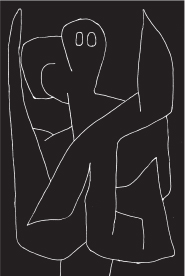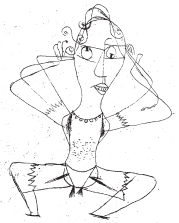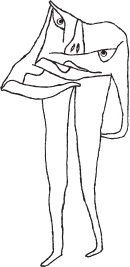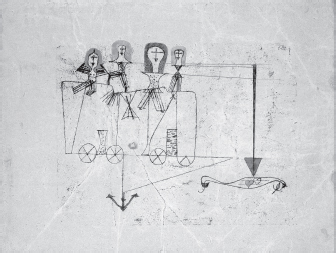The Storyteller (16 page)
Authors: Walter Benjamin

Riddles

Watchful Angel (Wachsamer Engel)
, 1939.
S
ome of our readers have perhaps already heard the joke which the ancient Greek Sophists (a school of philosophy) invented in order to demonstrate the complexity of human thinking. The joke is called âThe Cretan', because in it appears a man from the island of Crete, who proposes two statements. Firstly: all Cretans are liars. Secondly: I am a Cretan. So now what should we believe about the man? If he is a Cretan, then he is lying and is (because he maintained that he was one) not one. If he is not a Cretan, then he spoke the truth and
so is one. It is not clearly evident from this little joke that a debate developed in relation to it, in which significant minds have participated up until our day. One of the last ones to occupy himself with this question is the Englishman Bertrand Russell, who is still alive and who devised a whole number of such puzzle questions, which are named âRussell's Paradoxes' after him. They have a very serious background, but that does not prevent them from sometimes taking a jokey form, as, for example, the following: a barber lives in a small town, and in front of his shop he has a sign: âAll those who do not shave themselves are shaved by me.' But what happens to the barber himself? If he does not shave himself, then according to his own announcement he must shave himself. If he does shave himself, then according to his announcement he is not allowed to shave himself.
Now perhaps our readers might like to devise a joke like this themselves, and, to help them along, we include the following story:
A stranger came across a pretty garden and wanted to go in. But the gardener said to him that this garden was a special case. Because, namely, everyone who wanted to enter it had to advance a claim. If it is a true one, then he has to pay three marks. If it is not true, then he has to pay six marks. But the stranger, who was not keen on either, thought for a little while and advanced a claim that made the gardener as perplexed as the little jokes we just told made the reader. In this way the stranger gained admission without payment.
What was his claim?
Solution: The stranger, âI have to pay six marks.' If he really has to pay six marks, then his claim is true and he only has to pay three marks. If he doesn't have to pay six marks, then his claim is false and he has to pay six marks.
T
he famous Viennese man of finance L counted among his friends the actor Mitterwurzer, whom he had once helped with a loan. As its repayment was a long time coming, and after several reminders had borne no fruit, L sent his friend a ticket on which stood nothing other than
?
.
At their next meeting, Mitterwurzer pointed to the ticket and said: âYou are not only frugal with your guilders [
Gulden
], my friend, but also with your letters.'
âIf you can be frugal with letters, perhaps you might also learn it with guilders.'
âThat is not hard', replied the actor, âmy answer has only two letters'. The banker did not believe that possible and so they agreed to a wager. For the winner, the debt should be compensated or absolved. Mitterwurzer took his pencil and wrote two letters and won on the spot. How?
Solution: Gulden â G
ed
ulden.
1
â
Translated by Esther Leslie
.
Unpublished in Benjamin's lifetime and undated;
Gesammelte Schriften VII
, 301â5.
Radio Games

The Trumpet Sounds (Die Posaune)
, 1921.
Under the pine tree
with trembling jaw,
in pink satin
Gretchen leafs through the atlas,
and then hurries to the ball,
a ball made of snow:
âOh woe, my bouquet,
There is a struggle'!
She threatens with the comb,
Her neck bristles:
âIf you were only in a cage,
You good-for-nothing farmer!'
Under the pine tree an atlas lay open, and next to it was a ball and a bouquet of flowers, which had not yet been bound. This was proof that father and mother and child were disturbed when the farmer called for help from the ridge of the mountains.
Keywords:
Kiefer
(pine tree/jaw)
Ball
(ball)
Strauss
(bouquet/ostrich/struggle)
Kamm
(comb/ridge/neck)
Bauer
(farmer/cage)
Atlas
(atlas/satin)
â
Translated by Esther Leslie
.
First published in the
Südwestdeutsche Rundfunk-Zeitschrift
8, no. 3, 1932, 5. These are two listeners' responses to Benjamin's radio challenge.
Short Stories

What He Lacks (Was Fehlt Ihm?)
, 1930.
Why the Elephant Is Called âElephant'
I
t was once upon a time. There was a man called Elephant, but in those days people were not aware of the elephant in the way they are aware of it today, because this was several thousand years ago. And all of a sudden â everyone was really surprised â an animal appeared which did not have a name and the man saw it and, because it had a short nose and looked so similar to a human being, he adopted it and it stayed with him.
And it remained with him. He picked up a piece of wood, not a very long piece, but very heavy, and threw it, so the animal might go and fetch it. And because the animal did not
have any hands with which it could pick up the stick of wood, it tried to grasp the wood with its nose.
But the nose was very short and it was a lot of bother for the animal. And as it tried again and again and again â this took a very long time! â the nose grew longer and longer and longer from trying.
The thing about the name was earlier, when the nose was still short. And because the animal was with a man called Elephant, people started calling it elephant.
And by now the nose was so long that it could grab the piece of wood quite easily. And the animal felt good and got bigger and bigger. And today it is just as big and fat with a long nose-hand â yes, it is our elephant. That is the story.
How the Boat Was Invented and Why It Is Called âBoat'
B
efore all the other people, there lived one person and he was called Boat. He was the first person, as before him there was only an angel who transformed himself into a person, but that is another story.
So the man called Boat wanted to go on the water â you should know that back then there was a lot more water than today. He tied himself to some planks with ropes, a long plank along the belly, that was the keel. And he took a pointed cap of planks, which was, when he lay in the water, at the front â that was the prow. And he stretched out a leg behind him and navigated with it.
In this manner he lay on the water and navigated and rowed with his arms and moved very easily through the water with his plank cap, because it was pointed. Yes, that is how it was: the man Boat, the first man, made himself into a boat, with which one could travel on water.
And therefore â of course that is quite obvious â because he himself was called Boat, he named what he had made âboat'. And that is why the boat is called âboat'.
Funny Story from When There Were Not Yet Any People
I
n those days the earth was not yet firm and everything was boggy, like wet dough. First of all there was a tree, which was massive and could run â you see, the first trees could run like animals. The enormous tree went for a walk and ran and suddenly, right at the edge of the deepest bog, it fell with a huge splash into the water.
And in the same moment, everything turned solid. The dough became quite hard, and everywhere on the ground there were lumpy stones and sticks, so that people â which did not yet exist â simply would not have been able to walk, because it would have hurt too much.
Then the angel transformed itself down here for the first time and had wings of iron and looked at the earth. And then God sprayed something very wet again onto the earth and everything turned to bog and lake and sea once more.
But it dried out in the sun, and now it was flat in a lot of places. But now there were also mountains â because the great spraying had washed away the sand and made creases and folds â mountains, to be precise. When I spray, only little creases and lakes appear. If God sprays, then mountains appear.
And the angel, who was now walking down below, allowed his wings to melt and then they were gone and the angel was a person. But there were still lumps on the ground â like modelling sand. It bonded.
That is what the people were made from â first the gentleman who was called Boat. They formed themselves â they
simply became. The angel, who had also become a human, only needed to watch. They made themselves in his image.
Then the people built breakwaters and put up lots of monuments and iron men with broadly outspanned wings on them. But this was much later, a short time before they invented lamps.
â
Translated by Esther Leslie
.
Written 26 September 1933; unpublished in Benjamin's lifetime.
Gesammelte Schriften VII
, 298â300.
Four Tales

The Virtue Wagon (to the Memory of October 5, 1922) (Die Tugen Wagon [zur Erinnerung an 5. Oktober 1922])
, 1922.
A
t a place famous for day trips, not far from Q
Ä«
ngd
Ç
o, there was a section of rock which stood out on account of its romantic location and the steep cliff walls that dropped off into the depths. This wall of rock was the destination of many love-struck men during the happy phase, and, after each had admired the landscape arm in arm with his girl, they would stop for a bite to eat, accompanied by the same, at a nearby restaurant. This restaurant was doing very well. It belonged to Mr Ming.
Then one day a lover who had been abandoned got the idea of ending his life in exactly the same place where he had
enjoyed it to the fullest, and so, close to the restaurant, he flung himself from the rock into the depths. This inventive lover found imitators, and it wasn't long before this section of rock became as equally renowned as a place of skulls.
Through this new reputation, though, Mr Ming's establishment suffered; no cavalier dared to take his lady to a place where he had to be prepared to see an ambulance arrive at any time. Mr Ming's business got worse and worse, and there was nothing left for him except to think out a plan. One day he shut himself in his room. When he re-emerged, he went promptly to the nearby electricity station. After a few days a wire appeared, stretched along the outer edge of the romantic section of rock. A board hanging from it bore the words: âDanger! High voltage! Risk of Death!' Since then, those contemplating suicide avoided this area, and Mr Ming's business flourished as it did in former times.
P
otemkin suffered from severe, more or less regularly recurring bouts of depression, during which no one was allowed to go near him, and access to his chamber was strictly forbidden. This suffering was never mentioned at the court, in particular everyone knew that any reference to it would attract the disfavour of the Tsarina Catherine. One of the chancellor's depressions lasted for an unusually long period of time. Serious maladministration was the result; files piled up in the registries, which the Tsarina demanded must be dealt with â but this was impossible without Potemkin's signature. The high officials did not know what to do.
At this time, it just so happened that an insignificant little clerk called Schuvalkin turned up in the antechamber of the
chancellor's palace, where the privy councillors were wailing and lamenting as usual. âWhat is the matter, my excellencies? How might I be of service to my excellencies?' enquired the zealous Schuvalkin. The situation was explained to him and it was regretted that his services could not be put to any use. âIf it is nothing more than that, gentlemen', answered Schuvalkin, âthen leave the files with me. I kindly ask you.' The state councillors, who had nothing to lose, let themselves be persuaded, and Schuvalkin made his way, with the bundle of papers under his arm, through galleries and corridors, to Potemkin's bedroom. Without knocking, without even halting, he pushed down the door handle. The room was not locked.
In the semi-darkness Potemkin was sitting on his bed, chewing his nails, in a threadbare dressing gown. Schuvalkin stepped up to the desk, dipped the quill in ink, and without saying a word, thrust it into Potemkin's hand, with the first available file on his knee. With an absent glance at the intruder, as though in sleep, Potemkin administered the signature; then a second one, until all were done. When the last one was secured, Schuvalkin left the chamber without a fuss, just as he had entered, with his dossier under his arm. Triumphantly waving the files, Schuvalkin entered the antechamber. The privy councillors fell on him, ripping the papers from his hands. Breathlessly they bent over them. No one said a word; the group froze. Once again, the clerk approached them, once again he enquired hastily as to the cause of the gentlemen's dismay. At that moment his gaze fell on the signature. One file after another was signed: Schuvalkin, Schuvalkin, Schuvalkin â¦
I
n a Hasidic village, on the evening of the Sabbath's end, the Jews were sitting at a humble inn. They were all locals, except for one, whom nobody knew: a very poor man, dressed in rags, who cowered in the background in the shadow of the stove. The conversations had gone back and forth. Then one of them brought up the question of what each of them would wish, if he were given one wish. One wanted money, another a son-in-law, and the third a new carpenter's bench, and so they went around.
Once everyone had had their say, there remained only the beggar in the corner by the stove. Reluctantly and hesitantly he gave in to the question: âI wish I would be an all-powerful king who ruled over a vast land, and at night I would lie asleep in my castle and the enemy would break in past the border and, before dawn, horsemen would reach my castle, meet with no resistance, and, woken in alarm from my sleep, I would not even have time to dress myself, and, wearing only a shirt, I would escape past mountains and valleys and past forests and hills without respite day and night, until I arrived safely here at this bench in your corner. That is what I would wish for.'
The rest of them looked at each other uncomprehendingly. âAnd what would come from all that?' asked one. âA shirt' was the answer.
B
eppo Aquistapace was employed at a New York bank. The modest man lived only for his work. In four years of service he had been absent at most three times and never without a good excuse. It was all the more noticeable therefore when one day he unexpectedly did not turn up. When on
the next day, too, neither the man nor his excuse arrived, Mr McCormik, the staff manager, began to ask around in Aquistapace's office. But nobody could give him any information. The missing fellow entertained few relations with his colleagues; he kept company with Italians, who, like him, came from humble backgrounds. He referred to just this matter in a communication which provided Mr McCormik with information about his whereabouts a week later.
This letter came from the remand prison. In it, Aquistapace appealed to his manager with words that were as composed as they were urgent. A regrettable incident at his local bar, in which he was completely uninvolved, had led to his arrest. To this day he was unable to specify what caused the knife fight between his compatriots. Unfortunately it had claimed a casualty. He knew no one besides Mr McCormik who could vouch for his good name. McCormik, in turn, not only had a certain interest in the dutiful work of the arrested man, he also had connections which made it easy for him to put in a word for Aquistapace with the relevant authorities. Aquistapace had been incarcerated for only ten days when he resumed his duties at the bank. After the office had closed he called on Mr McCormik. Timidly he stood in front of his boss. âMr McCormik', he began, âI don't know how to thank you. Only to you do I owe my release. Believe me, nothing would give me greater pleasure than to show you my gratitude. Unfortunately, I am a poor man. And', he added with a modest smile, âas you well know, I do not earn a fortune in the bank. But Mr McCormik', he concluded with a firm voice, âI can assure you of one thing: if ever you should be in a situation whereby elimination of a third person could be profitable, then just remember me. You can count on me.'
â
Translated by Sam Dolbear and Esther Leslie
.
The âFour Tales' have appeared in various versions. One version of âThe Warning' appeared under the title âChinoiserie' in
Kölnische Zeitung
, 22 July 1933; another version appeared in the
Basler Nachrichten
, 26 September 1935. âThe Signature' and âThanks' appeared in the
Frankfurter Zeitung
, 5 September 1934, under the pseudonym Detlef Holz. A Danish version of âThe Signature' appeared in
Politiken Magasiner
, Copenhagen, 16 September 1934. The stories were published as a group in the
Prager Tageblatt
, 5 August 1934. The versions here follow an unpublished typescript with handwritten corrections. âThe Signature' finds a similar form at the beginning of Benjamin's 1934 essay on Franz Kafka, and âThe Wish' appears in the same essay in the section titled âSancho Pansa'.
Gesammelte Schriften IV
, 757â61.
